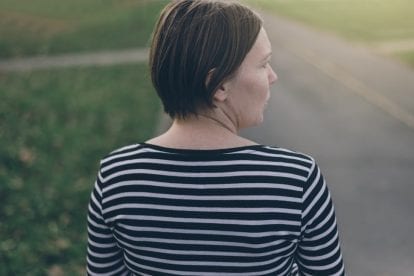Stand By Me: Repairing Sibling Synergy After Addiction

When I was five, my Mom came home from the hospital with a little baby boy (I suppose that technically I was four, but my birthday was close enough, and I was proud of my ‘almost-5’ status). She had my aunt put rollers in my long blonde hair earlier that day so that it was appropriately curly when it was time for a picture with the latest addition to our family. Sure enough, a picture was taken–one that I still have to this day. I’m on the couch, looking at the camera with a cheesy grin while holding a little white bundle in my lap, and anyone who was to look at the photo would know that an instant connection had been made.
As we grew up together, the bond between us only grew. Our parents worked a lot, and they worked opposite shifts; this left a lot of time for my brother and I to figure out how to preoccupy ourselves. I taught him how to read, he taught me how to care about someone more than I cared about myself. When our parents divorced–he was six, I was eleven–we stuck together like glue. Because I was older and understood what was happening a bit better than he did, I felt the need to protect him; we started to become even closer than we were before because we were going through the same emotional experience.
Blanket forts with horror movie marathons, backyard games derived from our own imaginations. Regardless of the fact that we had two homes to travel between, we were still inseparable. Little did I know, our relationship would become a tumultuous rollercoaster ride over the next ten years as my brother battled addictions with varying substances, as well as anxiety and depression. This type of situation is not exclusive to the two of us–it happens everywhere, every day. Addiction does not pick and choose those caught in its wake, and it is important to seek help when the ones we love face it.
Times, they were a changin’
When I went away to college, my brother was left with his demons–and I wasn’t there to help him with them. While I understand now that there was nothing I could do to prevent him from making the choices he did, I was heartbroken about it for a very long time. I just couldn’t understand why he was falling into the trap of addiction when he could see that it was hurting not only the people around him, but more importantly, himself. It began with excessive marijuana usage, and slowly grew into a hungry monster that could only be fed by stronger substances. He turned to prescription pills, cocaine, and heroin–sometimes at the same time–and became someone I could no longer recognize.
Because I was only home during holidays and vacations, and because he was battling with the burdens of substance abuse, we inevitably grew apart. Where before our time spent together was full of laughs and a sense of comfort, it was now filled with confusion, anger, sadness, and resentment. Even as a broken family, we came together to sit down with him and talk to him about his addictionsand behaviors the best way we knew how. As much as we tried to encourage him to seek treatment, he wasn’t willing to take that step yet. Not only did that hurt me deeply, as I wanted nothing more for him than to begin to heal, but it left me with personal anguish and emotional turmoil that I would have to deal with later on.
Begin Your Recovery Journey Today
866-922-1350Breaking point
In October of 2012, my brother went to jail for a short period of time. Shockingly enough, it was not for drug charges, but was for violating probation. Because I was living in Washington, D.C. at the time, I was only able to speak to him on the phone beforehand, and only spoke to him once during those few months. While I was still hurting deeply from the effects of his addictions, I was doing a lot of self-love work and self-acceptance practices in order to deal with my own personal issues regarding our relationship. I could no longer hold on to both his pain and mine. I dramatically changed my own perspective on my brother and his behavior through months of therapy, a yoga routine, meditation and breathing exercises, healthy eating habits, and nourishing my own needs above the ones I thought he needed me to fill. While the same re-connecting strategies may not work for everyone, it is important that you not only encourage your sibling or loved one to seek treatment for their addictions, but that you value your own mental, physical, and emotional health as well.
Gluing together the pieces
After my brother was released, it was almost like we were strangers. Not only did we have to get to know each other again, but we were doing it as adults, and adults put up walls to avoid pain. Neither of us wanted to get hurt by the other, and I was deathly afraid that I would fall into the same trap of putting my own physical and mental health secondary to his–which is something I had done for a very long time. Where could we even begin? How was this stranger my brother?
Thankfully, with the help of support groups, friends, and family members that had been through similar circumstances, and a lot of honest conversation, we were able to find that unique synergy we had lost in the war waged by substance abuse. We began with honesty and trust–which are two things absolutely vital to restoring any relationship that has been ravaged by addiction. I was strong enough to let him know that while I always would love him, I wouldn’t subject myself to the turmoil I had once faced in trying to solve his problems. He was strong enough to understand that I was setting limits for myself out of love, and was respectful of those boundaries. We began to laugh together again, comfortable enough with each other that we could allow a little bit of vulnerability to seep into the cracks of our fractured relationship, and it acted like glue.
Even today, we still have to consciously work on our relationship–just like any other one. We will always have that incredibly special bond with each other, and it is even more apparent now, when we are both growing into our own adult skins. Perhaps the most important part of our journey together has been one of acceptance: me of my brother, and both of us in relation to ourselves. I accept that my brother has struggled and will continue to battle addiction his whole life, and I have accepted that I don’t have the ultimate power to control his decisions. This knowledge has not only improved our relationship, but it has set me free from the anxiety my heart once held so close. While our relationship as it stands today may not be what I imagined when I was holding him for the first time, I know that the love between siblings remains true, no matter what types of addiction or struggle try to burn it down, and that synergy is a gift I am thankful for every day.
Being the loved one of an addict is never easy. You may feel just as much pain and suffering as your addict, and it can get really difficult to stay positive–but the good news is that relationships damaged by addiction can be repaired. If you have questions or need support in your journey with an addicted loved one, please contact Alta Mira today–our qualified and compassionate professionals are always here to help you in your times of struggle.






